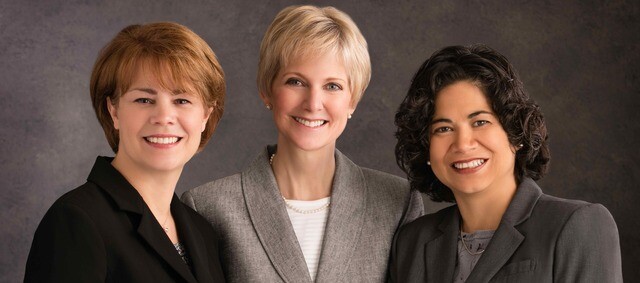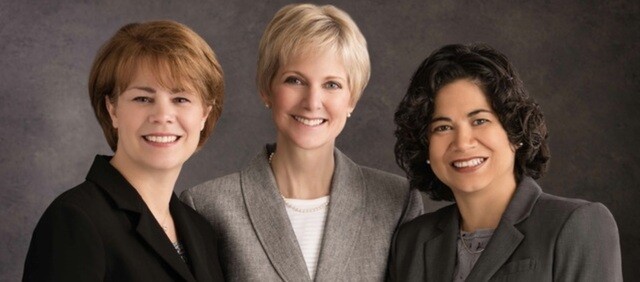The night before she was called as Relief Society General President, Jean B. Bingham contemplated the purpose behind a meeting that was scheduled between her and President Thomas S. Monson the next morning. “What could he possibly want to talk to me about?” she remembers asking herself.
“Of course, I knew it was time for a new Relief Society [General] President to be called, but that couldn’t possibly be me,” she thought. “However, as my mind turned over and over, the thought came to me, ‘Well, if that is the topic for the interview, who would I want for counselors?’ And immediately the names came to me: Sharon Eubank and Reyna Aburto.”
On this week’s All In podcast, President Bingham and her counselors were asked to reflect on their calls as well as the unique experiences that have allowed them to minister more effectively to the sisters of the Church. Read a continued excerpt of this conversation with President Bingham, Sister Eubank, and Sister Aburto below.
Listen to the full episode here or read a transcript of the entire interview here.
The following excerpt has been edited for clarity.
President Bingham:
Now I did not know Sharon personally, but I knew of her excellent work and her stellar character, and it felt right. And Reyna I had worked with on the Primary General Board, and I was impressed with the way that she always came back to the simple basics of faith and doing the work in the Lord's way. But more important maybe is that each of them have perspectives that are very different from mine. Sister Eubank is not married, was successful in her career, [and] had done a great deal of international work. Sister Aburto was a Spanish-speaking convert to the Church, who had experienced divorce and single parenthood among other experiences. And each of these women have proved invaluable in understanding and reaching more of our sisters because of their unique perspectives. I absolutely know that Sister Eubank and Sister Aburto were chosen by the Lord.
Morgan Jones:
So I want to come back to some of those things that make Sister Eubank and Sister Aburto so unique—and they offer unique perspectives to sisters in the Church who are also in those particular life situations. But before I get to that, Sister Eubank and Sister Aburto, how have you seen that Sister Bingham was the right woman for this calling?
President Bingham is mouthing that, “That's not true," but it is true. We all know it.
Sister Eubank:
It's so true. I could talk about this for such a long time, because I have such strong experiences with President Bingham. The first week that our presidency was called right after general conference, she got the assignment . . . to go to the United Nations. So she's bundled up onto a plane and shows up at the United Nations. And I sat in the audience as her companion. And I watched her articulate, compassionate, strong social skills, full of faith in Jesus Christ, completely unafraid. And I thought, “That's my Relief Society.” I was so proud. And she had the ability to do that the first week she was called. She has a really strong relationship with President Nelson, and a lot of the talks—her talk, and his talk particularly that came out of the women's session last October—were a result of their conversation. And I really, really appreciate that there's prophetic interaction with the General Relief Society President. But don't get mad if I tell you this—but Sister Bingham was raised in New Jersey. And every once in a while, you'll get a little New Jersey edginess that goes on. She is not afraid to tell it like it is and push for some results if we're not getting results. And I adore that about her. And it makes her a really effective leader.
Morgan Jones:
That's amazing. President Bingham, I didn't know that you lived in New Jersey.
President Bingham:
Oh yeah, I can walk the dog and play basketball with the best of them.
Morgan Jones:
Amazing. Sister Aburto, what would you say about that?
Sister Aburto:
I would like to say that from the first day, I could feel the mantle of President Bingham. I could feel the mantle of her calling. And I have been able to see that continuously. She's real. She's classy. She's truly an elect lady. And she's a faithful daughter of Mother Eve. She has a strong testimony of the gospel. She is steadfast and immovable, like Sister Eubank said, and she feels the utmost respect for the Brethren. She's a true believer of the interdependence between men and women, and that in order to bring to pass the purposes of God, we need to labor together. And she's a believer that we should not compete, not compare, not look down on anybody, but uplift and inspire others so we can bring them to Christ. But I also would like to say that I do think that this is not about us. This is about the Lord's work, because this is His work, and we are His servants.
Morgan Jones:
So well said. So like I said, I want to talk a little bit about some of these unique qualifications, you could say, about your background and your experiences and how those have allowed you to uniquely minister to the sisters of the Church around the world. Sister Eubank, I can relate to your experience being single in the Church. And I can personally say that myself and a lot of other women that I love dearly and care about are so grateful to you for your example. And you wrote an article that I really love, "A Letter to a Single Sister in the Church," which is fantastic. We'll link [to] it in our show notes. But I wondered, in this moment, what would you say to other single sisters in the Church? And why are you grateful for your experience as a single sister in the Church?
Sister Eubank:
Well, I would say that I hope being single isn't the most interesting thing about us. I can remember sitting in an early meeting when we were first called as a presidency and the data was given that two-thirds of the Relief Society at any given time is single. And I just remember being blown away, because I always felt like a minority. And I believe from my own experience, there's tremendous untapped strength in the single members of the Church. And every circumstance is going to have advantages and disadvantages too. But I want to leverage the advantages of my single period. And I don't think there's a lot of benefit in labeling us or segregating us by the current circumstance that we're in. And so I really appreciate the movement of the Church right now to say, "Life circumstance comes and goes, but our devotion to Jesus Christ, our devotion to each other—that's the most important thing about us."
And maybe you'll just let me say one other thing. This is personal to me. And I don't know if other people feel this way. But I believe because God can see everything, He sees the future, He sees the past. He looks at my life, He knows who my husband is, He knows who my kids are, and He sees the line where we intersect. And I think, to Him, it's an accomplished fact. So when He looks at me, He sees the whole me. And it's not that important to Him where I am on that line right now, as long as I'm heading toward His vision and the blessings that I hope I'll have. So I need to think of myself more holistically. I don't want to wait around. My advice would be, take control. Take spiritual and physical control of your life. If you want something to happen, then make it happen by your faith. That's President Nelson, you know, in "A Plea to My Sisters." And if you need a better emotional support network, then build one. We are people who can act and not be acted upon. And I love that gospel doctrine.
Morgan Jones:
I could not agree more. And I think one thing that I love that you said, is you hope that [being single is] not the most interesting thing about us. And I think that the most important piece of our identity is that we are disciples of Jesus Christ, and everything else just trickles down from there. And so the same is true of Sister Aburto. But we're going to touch really quickly on the fact that Sister Aburto went through a divorce, which undoubtedly connects her to a large number of women and men throughout the Church. If there's someone listening to this, Sister Aburto, who's currently going through that, what would your advice be to them? And how has that experience of having gone through a divorce allowed you to connect with women throughout the church? Or men, for that matter?
Sister Aburto:
Well, I would like to say that, regardless of what we are going through, we all have a story. And some of us do not tell our whole story, because maybe it's too personal or too painful. But we need to realize that because we are in a mortal state, we do not have control over many things. For example, we cannot control other people's agency, because that will be contrary to that plan. So my advice would be to look around and try to have eyes to see the miracles around us. And also to try to have ears to hear what the Lord is trying to tell us and to teach us. Because we are never alone. You know, we always have that divine help at our reach. And I think that we need to count our blessings and feel joy in the present. Because everything, everything that we are going through will give us experience and it will be for our good. Another thing is that our story is not over yet. Like Sister Eubank said, we need to look at ourselves in a more holistic way and with a perspective that is more eternal. And we need to realize that great things are happening around us and that great things will happen also in the future. And the fact that we are going through this hard time right now will give us the sensitivity and the compassion to help other people that may be going through similar situations. And that we can also ask ourselves, "How can we become better instruments in God's hands to bless others? And to truly see the miracles that are happening around us?"
► You may also like: 'We are stronger than we think': Sister Aburto teaches in Deseret Book LIVE video how to be steadfast and immovable
Lead image: Intellectual Reserve, Inc.


